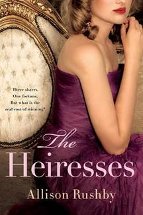The heiresses by Allison Rushby

Pan Macmillan, Sydney, 2013. ISBN 9781742613147.
(Age 16+) Recommended. Imagine an episode of Gossip Girls
set in roaring twenties London and you can imagine the world of this
novel: high society, parties, alcohol and young girls concerned
about money and beaus.
The central story concerns a set of triplets who were separated at
birth when their mother died. At age 17, their aunt brings them back
together in the hope of restoring her sister's legacy to her nieces.
But first there are several puzzles to solve and deals to be done.
For the girls are essentially battling for their share in a personal
fortune which could change their lives: for Thalia it could bring a
welcome escape from her dour 'family', for Ro it could enable her to
study at university, whilst Clio would be able to provide her ailing
mother with the care she so desperately needs. The key question is
whether the girls will work together in their new-found sisterhood
or whether their own personal desires will stand in their way.
Whilst London in the 1920s is captivatingly drawn and Allison Rushby
has assembled an engaging cast of characters, there is something
rather formulaic about this novel. Each of the girls seems to be a
particular type: the sharp-tongued, party-loving Thalia, the steady
and rational Ro and the kind-hearted Clio (who just happens to have
been raised by a vicar). Despite some twists and turns, there is
also a sense of predictability in the plotting: by novel's end all
has been explained, wrongs have been addressed (if not always
righted) and each of the girls is looking forward to a brighter
future. We even have a marriage in the closing pages.
There may be nothing particularly new in this novel but the story is
told in an engaging manner and there are sufficient romantic
entanglements to keep teenage girls captivated. This is an enjoyable
light read but with the heady mix of drugs, alcohol and sex that
seems to overtake the lives of these sisters, some school libraries
may prefer to promote this book to more mature readers.
Deborah Marshall